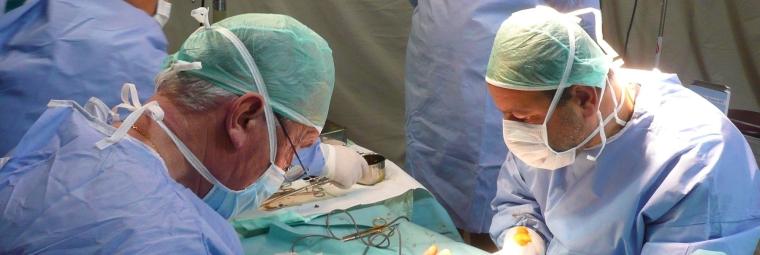The Gaza Strip: hand surgeon Dr Stefan Krieger’s mission account

Hand surgeon Dr Stephan Krieger carried out a 3-week mission with MSF between 21 November and 8 December 2011 in the Nasser Hospital in Khan Yunis, in the Gaza Strip. Working with local surgical teams, he performed 4 to 5 operations a day, 35 patients in total, over the 3 week period, focusing on sequelae from major burns.
MSF signed an agreement with local health authorities in 2010 to launch a specialist surgical programme at Nasser Hospital, Khan Younis, Gaza Strip. Several times a year, international teams of surgeons, operating room nurses and anaesthetists go on missions during which they work closely with the Nasser Hospital teams. As with MSF’s other activities in Gaza, the aim of this surgical programme is to try to improve the sequelae suffered by injured patients, and allow them to regain as much usage of their limbs as possible.
For Dr Krieger, this mission represents an opportunity to provide specialised medical care in the Gaza Strip.
The team works out of an MSF mobile field hospital which was set up last August within the Nasser Hospital complex. As the Nasser Hospital facilities are currently being renovated, space there is limited. Due to heavy rain the week before, the MSF inflatable hospital needed some repairs, and the floor of the tent was raised with wooden pallets. Another challenge in terms of hygiene and noise issues was the ongoing repair works along the road next to our tent, with dirt flying everywhere and machinery passing by every five minutes. Aside from these minor inconveniences, all the medical equipment that I needed was available to me, both the hygiene and sterilisation were most satisfactory, and patient organisation and daily logistics were very well-managed by the local teams. As for the logistics of the actual surgery, everything was skilfully taken care of by the MSF Operating Room Nurse. The team spirit was hugely inspiring.
Before I arrived, the local teams identified 220 potential patients. Consultations started on November 23rd, and were carried out in collaboration with Dr Hassan Hamdan, Head of the Burns Unit at Nasser Hospital. Based on our inclusion criteria, 56 of these 220 patients were identified as eligible for surgery. 80% of cases were burns sequelae, followed by congenital hand deformities and one instance of a tumour. 89% of the patients that we operated on were younger than 18 years old, and 36% were female. We operated over a period of 9 days and were able to carry out between 4 and 5 operations each day, 35 in total. The MSF anaesthetist was very experienced, and was even able to anaesthetise very young children. I was very pleased with what we were able to accomplish for the patients. Hygiene protocols were strictly adhered to, especially during pre-operation preparation and patient disinfection, and we did not have a single case of infection. Most patients who underwent hand operations were then monitored in the MSF rehabilitation clinic. Dressings, splints and physiotherapy sessions were handled here, with supervision by doctors and physiotherapists.
Between operations we were able to dress wounds or carry out consultations with new patients. Cooperation with Dr. Hamdan was excellent. He was very interested in learning new techniques. We had some very rewarding discussions, and when I left I made sure he had copies of all my e-handbooks for further reading.
Security was not an issue during my mission; we could move about freely and go to work every day. Even when incidents occurred overnight, our own security was never affected.
I think that MSF has a lot to do in terms of surgery in Gaza, especially with regard to hand surgery and caring for burn sequelae. This mission was very challenging, but also very successful.
Dr. Krieger came back very pleased with the work that had been done in Gaza. He would even like to go back there, and recommends this programme to other surgeons. This type of ad-hoc mission is also an opportunity for MSF and Palestinian specialists to discuss medical techniques and specialized surgical procedures, as well as anaesthetic techniques with a particular focus on young children.

Burn/Plastic/Hand surgeons needed
Burn and plastic surgery of the hand are done in Haiti, Jordan and the Palestinian Territories. Médecins Sans Frontières began treating burn victims in 2007 in collaboration with a team of specialists from the Edouard Herriot burnt center in Lyon. The burns represent 30% of our surgical activity. Improving our multidisciplinary management of burnt patients remains a priority for MSF.
Discover the job description

